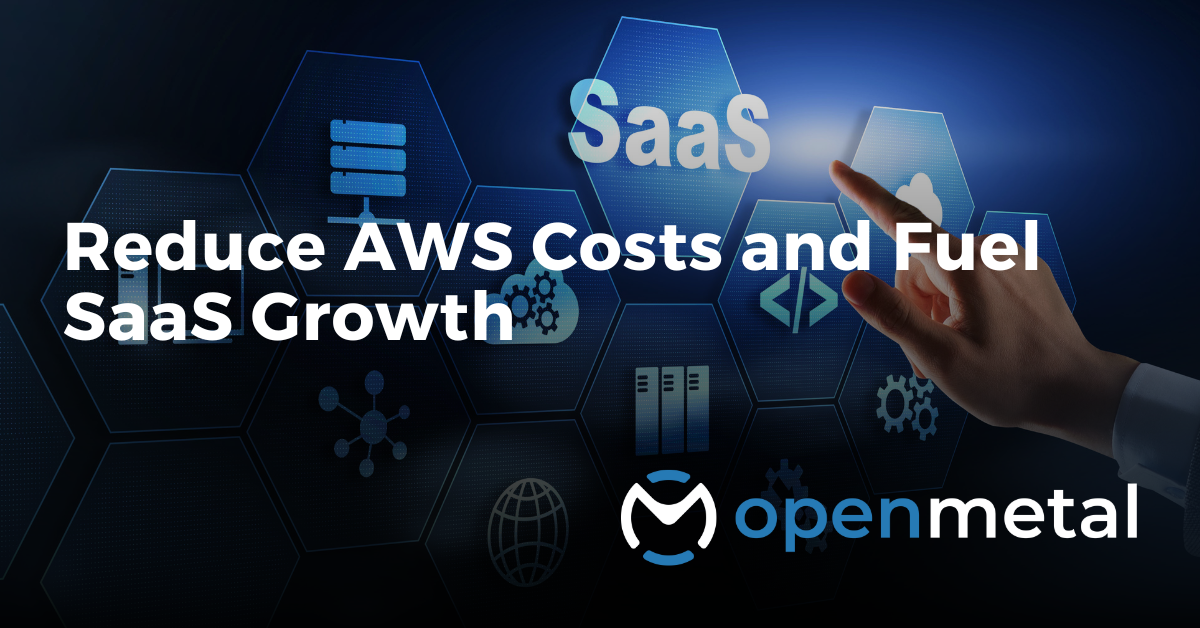The efforts of a few mega cloud providers have made public clouds like AWS the de facto option for most SaaS providers. But as with any technology there are AWS pros and cons that must be weighed when making hosting decisions. SaaS providers brave enough to go against these norms are discovering success with SaaS hosting on public cloud alternatives such as hosted private cloud and open source solutions.
The Rise of SaaS Hosting on AWS
Ask providers and it will be no surprise that most SaaS hosting is on public clouds from Amazon Web Services (AWS), Google Cloud Platform (GCP), or Microsoft Azure. These three cloud providers combined account for over 60% of the cloud infrastructure providers in the world.
Their rise to prominence is not without its merits. AWS helped to revolutionize the digital transformation age. They leveled the playing field for organizations that did not have the resources or capital to build or operate their own physical infrastructures. And they have been able to grow their SaaS hosting significantly over the years by supporting and growing alongside providers.
Now, every argument has a counterargument that SaaS providers must consider in their hosting decision.
AWS pros and cons include:
Cost-Efficiency for SaaS Hosting
- Pros: As mentioned above, AWS pricing has leveled the paying field for many small businesses and start-ups with flexible pricing options and pay-as-you-go models. This can be attractive for SaaS providers that are looking to optimize their initial operating costs.
- Cons: It should be no surprise that these costs can increase quickly. This is especially true if users unintentionally leave resources running or fail to optimize their usage. These unpredictable overrun costs, along with other hidden costs (such as data transfer costs) can make it extremely difficult to forecast and/or manage monthly cloud budgets.
Many SaaS providers are happy to share that they are using AWS. When asked about their experience, they will even share that it works well for them. But it is also not unusual when asked about the costs that these same SaaS providers will quickly turn and complain that their costs are out of control…with many not even knowing “what” they are paying for on their invoices.
Service Reliability for SaaS Hosting
- Pros: As a leading cloud brand, you would expect that AWS offers unprecedented service metrics. Depending on which article you read, the AWS platform offers 5 (sometimes 6 pillars) of a “well-architected framework” that outlines guidelines for redundant systems, infrastructure redundancy, and robust security measures—all meant to minimize service downtime.
- Cons: Although AWS offers good uptime services, it is not infallible. It does go down like most every other provider. However, when AWS does go down, there is one critical consideration that needs to be asked. How quickly or easy will it be to get AWS to respond and help resolve to get you back up and running?
One concern that sometimes arises with SaaS Providers is the very public media coverage of AWS outages. If your SaaS hosting is dependent upon AWS services, this can be a deterrent for customers who are evaluating the reliability of your software services.
Technical Support for SaaS Hosting
- Pros: With vast support resources, AWS offers vast sets of documentation, tools, and support packages for SaaS development teams.
- Cons: While AWS offers unlimited support and services, time and costs are a factor in this experience. Unless you are paying a premium for one of the Enterprise Support plans which “start” at greater than $5,500/month (On-Ramp) or greater than $15,00/month (Enterprise), you are at the mercy of their response times if you experience service issues. Their plans show General Guidance response times of less than 24 hours, System Impairment times of less 12 hours and Production Impairment time of less 4 hours.
Security and Compliance for SaaS Hosting
- Pros: With extensive reach in the IT space, it is obvious that AWS has the ability to deliver numerous services including access control, encryption, auditing, and other data protection solution that help SaaS providers build secure applications and support regulatory requirements.
- Cons: Despite the breadth of security options, it is still a public cloud. This can create concern for some developers as it means that data is still being stored on shared cloud resources that may be more susceptible to potential security breaches. Because developers have no direct control over the servers, this can compound fears. Lastly, because AWS hosts clouds from data centers worldwide, developers may not know where their data is, which may also put some compliance requirements at risk.
Extensive Service Portfolio for SaaS Hosting
- Pros: AWS has a far and wide reaching portfolio for compute services, storage, etc., which are well-suited for scalable, cloud-based SaaS platforms.
- Cons: AWS market influence over many of these services, either directly or indirectly, has created vendor lock-in scenarios. This has made it costly and/or complicated to transition away from them to any other provider or to shift to different SaaS hosting platforms. Additionally, this extensive list of available services can often create confusion or difficulty for SaaS developers trying to navigate and understand all available options on their own.
Some feel that the extensive service influence of AWS has actually squeezed out competitors and increased proprietary technologies and costs.
Is AWS Becoming a Cliché?
Despite all of the AWS pros and cons, AWS has become a status quo for SaaS hosting. In fact, the expectation of SaaS providers defaulting to AWS has almost become cliché. Most are familiar with the old and well-known adage that says “No one ever got fired for buying IBM”.
The intent of this saying was to suggest that nobody gets fired for buying the leading mega brand – that the “safe” choice is the best. Have we merely replaced IBM with new cloud mega brands? I think the argument could be made that a majority of the market has unknowingly fallen into that same tired cliché. This time, however, AWS has become the “standard” or leading mega brand that users just go to for cloud because it is familiar and what “everyone else does”.
What’s interesting is that AWS has become such a “norm” that many of their customers fail to realize, or are indifferent, that their cloud costs are funding Amazon’s e-commerce site which may actually be competing with their own business. If you don’t believe it, search who Best Buy, which offers online shopping, chose as their cloud provider platform.
This does not need to be the case. New advancements in private cloud and open source technologies have created powerful new public cloud alternatives that should not be overlooked.
Break the Cloud Norms
OpenMetal eases the build and deployment of a hosted private cloud and transition from public cloud by offering something truly different. OpenMetal on-demand clouds deliver the best capabilities of traditional public cloud, private cloud, and bare metal fused into an open source platform. Each hosted private cloud starts with an OpenMetal Cloud Core of three dedicated servers built, Ceph storage, and the most commonly needed standard features right out of the box.
This new platform allows SaaS companies to gain the security, control, and utilization of a single tenant, private cloud environment, that is cloud native, but can still be deployed in 45 seconds and scaled with the convenience of public clouds.
When looking at the AWS pros and cons for SaaS hosting here is how OpenMetal compares:
- Cost-Efficiency. Save up to 50% off AWS cloud cost though more efficient resource utilization, egress cost control, and transparent pricing and billing.
- Service Reliability. Rest assured that our OpenMetal clouds are hosted within one of our world-class, Tier III data centers to ensure the greatest levels of service reliability, performance, security and network connectivity.
- Technical Support. Work directly with our cloud team for complimentary consultation, assisted builds and deployments, and support (including possible direct Slack channels to cloud engineers).
- Security and Compliance for SaaS Hosting. Protect your data and applications in a single tenant environment that is not shared with any other users.
- Extensive Service Portfolio. Open up your SaaS hosting to the widely available open source technologies that you have access to via the OpenStack platform foundation of OpenMetal clouds.
Are You Open to New Ideas?
If you want to better understand the potential cloud savings, we can help. Schedule a consultation with our cloud team to do an initial assessment. It’s a no-pressure, complimentary discussion to understand your challenges and goals, review your current cloud bills, and identify any opportunities to reduce your spend. Reclaim capital that you can use to fund new grow, rather than continuing to overpay large public cloud providers.
More on the OpenMetal Blog…

Reduce AWS Costs and Fuel SaaS Growth
When SaaS providers consume large amounts of public cloud, a move to a hosted private cloud may reduce current AWS costs up to 50%. This can…Read More

Migrate From AWS to On Premise
Ready to explore the advantages of on-premise clouds alongside Todd Robinson, the President of OpenMetal? Under his guidance, delve into the details and acquire valuable insights on establishing your very own on-pre…Read More

Public Cloud Waste at 28%: Time to Consider On-Demand Private Cloud as an Alternative?
The 2023 State of Cloud report by Flexera includes a statistic about annual public cloud waste being at 28%. According… Read More
Test Drive
For eligible organizations, individuals, and Open Source Partners, Private Cloud Cores are free to trial. Apply today to qualify.
Subscribe
Join our community! Subscribe to our newsletter to get the latest company news, product releases, updates from partners, and more.




































